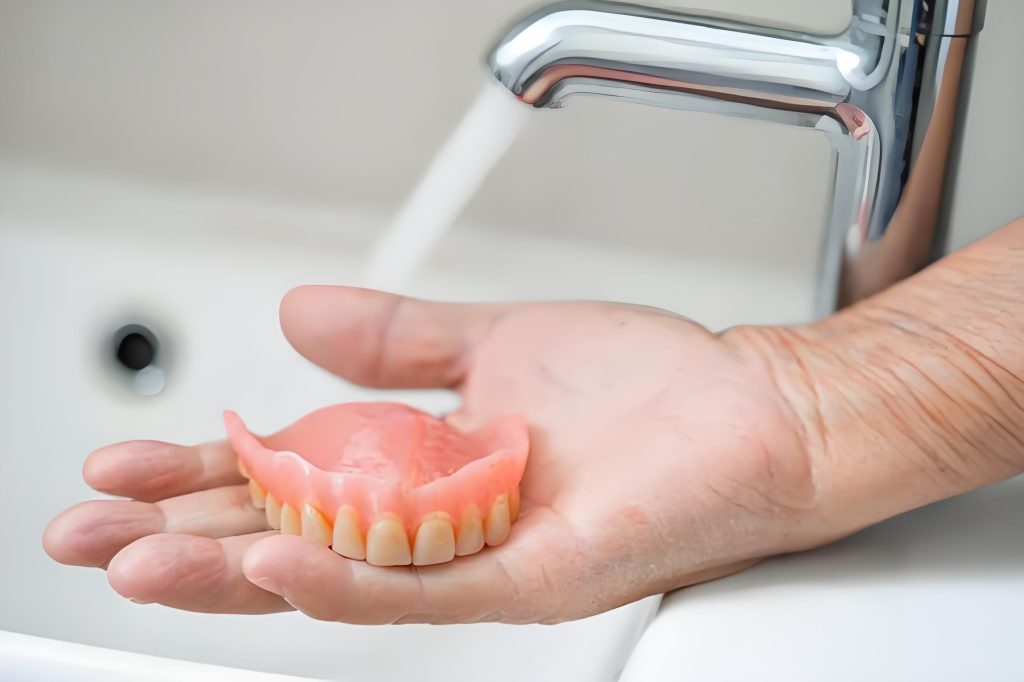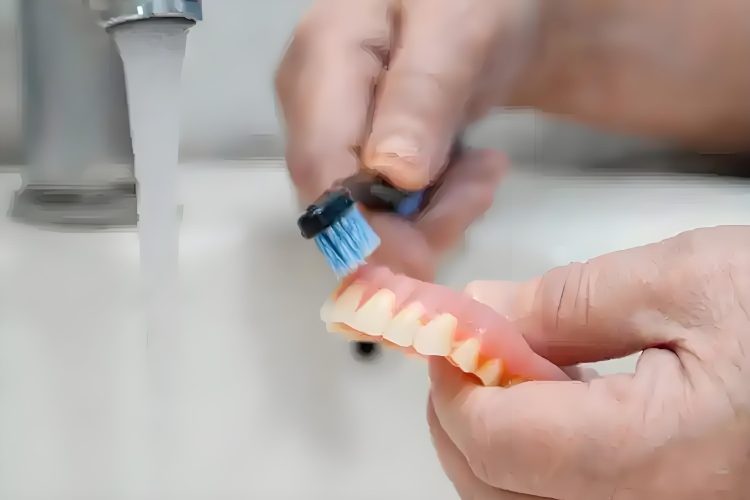As we navigate the complexities of caring for our elderly loved ones, ensuring their oral health often takes a prominent role. For many seniors, dentures serve as a vital component of their daily life, enabling them to eat, speak, and smile confidently. However, the proper cleaning and maintenance of these artificial teeth can be a source of confusion for both caregivers and the elderly alike. In this comprehensive guide, we will delve into the intricacies of caring for dentures, offering practical advice to keep them in optimal condition and promote overall oral health.

Understanding the Importance of Clean Dentures
Dentures, whether partial or full, are designed to replicate the function and appearance of natural teeth. They play a crucial role in maintaining a person’s nutritional intake, speech clarity, and facial structure. Yet, like natural teeth, dentures require regular cleaning to prevent the accumulation of plaque, food particles, and bacteria. Neglecting this crucial aspect can lead to a myriad of issues, including bad breath, gum irritation, and even more serious infections.
Moreover, poor denture hygiene can accelerate the aging process of the prosthesis itself, leading to cracks, stains, and a shortened lifespan. Therefore, establishing a robust cleaning routine is not just about maintaining oral health; it’s also about preserving the investment in quality dentures.
Daily Cleaning: The Foundation of Good Denture Hygiene
- Remove and Rinse:
The first step in any denture cleaning routine is to remove the dentures from the mouth and rinse them thoroughly under warm, running water. This initial rinse helps to dislodge any loose food particles or debris that may have accumulated during the day. - Use a Dedicated Denture Brush:
A soft-bristled denture brush is essential for gentle yet thorough cleaning. Avoid using abrasive toothpastes or regular toothbrushes, as they can scratch the surface of the dentures, leading to discoloration and damage. Instead, opt for a denture-specific cleaner designed to be gentle yet effective. - Soak Overnight:
After brushing, soaking your dentures in a denture-cleaning solution overnight can further help to remove stubborn stains and disinfect the prosthesis. Ensure that the solution you choose is compatible with your denture material and follow the manufacturer’s instructions carefully.
Addressing Common Challenges: Stubborn Stains and Plaque
Stubborn stains and plaque build-up can be particularly problematic for denture wearers. Here are some effective strategies to tackle these issues:
- Regular Use of Antiseptic Solutions:
Incorporating an antiseptic solution into your cleaning routine can help to reduce the bacteria that cause plaque. Look for solutions that are approved by dental professionals and specifically formulated for dentures. - Stain Removal Techniques:
For persistent stains, you can try soaking your dentures in a solution of baking soda and water (one teaspoon of baking soda per cup of water). Soak for about 15-30 minutes, then brush gently and rinse thoroughly. Be cautious with this method, as prolonged soaking or excessive baking soda can sometimes damage the denture material. - Professional Cleaning:
If home remedies fail to remove stubborn stains or plaque, it may be worth considering a professional cleaning by a dentist or dental hygienist. They have access to specialized tools and techniques that can restore your dentures to their original brightness and cleanliness.
Caring for Soft Liners and Sensitive Gums
Many dentures come with soft liners to enhance comfort, especially for those with sensitive gums. Proper care of these liners is crucial to prevent irritation and ensure continued comfort.
- Gentle Handling:
Always handle dentures with care, especially when they have soft liners. Rough handling can damage the liner, leading to discomfort and potential infection. - Avoid Over-Soaking:
Prolonged soaking in strong cleaning solutions can degrade soft liners. Follow the manufacturer’s guidelines for soaking times and solutions to ensure you’re not compromising the integrity of the liner. - Regular Dental Check-Ups:
Regular visits to the dentist are not just for natural teeth. They allow for early detection and management of any issues related to denture fit, soft liner wear, or gum health.
Preventive Measures: Extending the Life of Your Dentures
Beyond daily cleaning, there are several preventive measures you can take to extend the lifespan of your dentures and maintain optimal oral health:
- Regular Dental Examinations:
Even if your loved one wears dentures, regular dental check-ups are vital. The dentist can assess the fit of the dentures, check for signs of gum disease, and offer personalized advice on care and maintenance. - Adjusting to Changes:
As our bodies change, so do our oral structures. Regular adjustments by a dental professional ensure that the dentures continue to fit comfortably and function effectively. - Avoiding Hard Foods and Sticky Candies:
Hard foods and sticky candies can put undue pressure on dentures, causing them to crack or break. Opt for softer foods that are easier to chew and less likely to damage the prosthesis. - Storing Dentures Properly:
When not in use, always store dentures in a clean, dry container filled with water or a denture-soaking solution. Never wrap them in paper towels or leave them exposed to air, as this can cause them to warp or dry out.
Addressing Myths and Misconceptions
In the realm of denture care, several myths persist that can lead to improper care and potential harm. Here are a few common misconceptions to avoid:
- Myth: Toothpaste is Fine for Cleaning Dentures
Fact: Regular toothpaste is too abrasive for dentures and can scratch the surface, leading to discoloration and wear. Always use a dedicated denture cleaner. - Myth: You Don’t Need to See a Dentist if You Have Dentures
Fact: Regular dental check-ups are crucial for monitoring the fit and health of your dentures, as well as your gum and jawbone health. - Myth: Soaking in Hot Water is Effective for Disinfection
Fact: Extremely hot water can warp the shape of dentures, damaging their fit and function. Always use lukewarm water and follow the manufacturer’s cleaning instructions.
Conclusion: A Smile Worth Preserving
Caring for your elderly loved one’s dentures is a delicate balance of routine, precision, and attention to detail. By following the guidelines outlined in this guide, you can ensure that their dentures remain clean, comfortable, and functional for years to come. Remember, good denture hygiene is not just about appearance; it’s a cornerstone of overall health and well-being. By investing time and effort into proper care, you’re helping your loved one maintain their dignity, enjoy a nutritious diet, and continue to smile brightly through the years.













































Discussion about this post